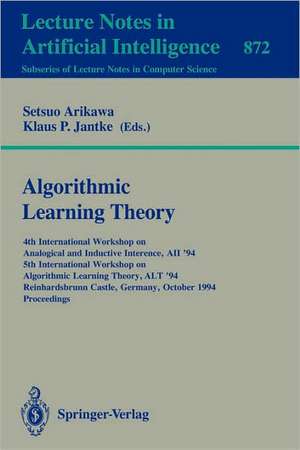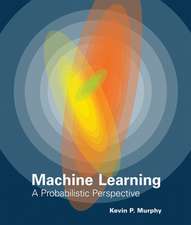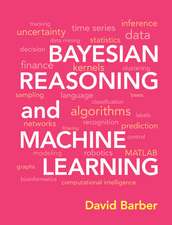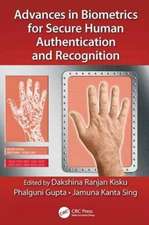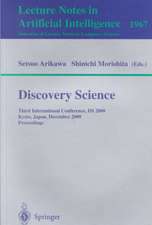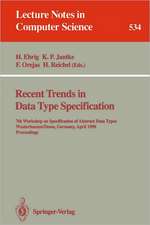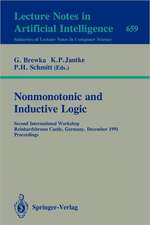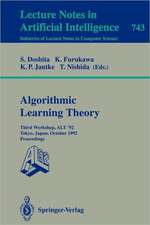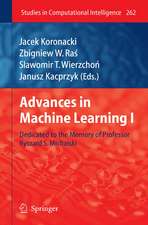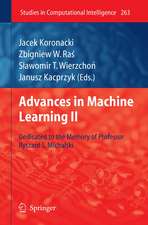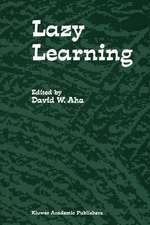Algorithmic Learning Theory: 4th International Workshop on Analogical and Inductive Inference, AII '94, 5th International Workshop on Algorithmic Learning Theory, ALT '94, Reinhardsbrunn Castle, Germany, October 10 - 15, 1994. Proceedings: Lecture Notes in Computer Science, cartea 872
Editat de Setsuo Arikawa, Klaus P. Jantkeen Limba Engleză Paperback – 28 sep 1994
The book contains revised versions of 45 papers on all current aspects of computational learning theory; in particular, algorithmic learning, machine learning, analogical inference, inductive logic, case-based reasoning, and formal language learning are addressed.
Din seria Lecture Notes in Computer Science
- 20%
 Preț: 1061.55 lei
Preț: 1061.55 lei - 20%
 Preț: 307.71 lei
Preț: 307.71 lei - 20%
 Preț: 438.69 lei
Preț: 438.69 lei - 20%
 Preț: 579.30 lei
Preț: 579.30 lei -
 Preț: 410.88 lei
Preț: 410.88 lei - 17%
 Preț: 427.22 lei
Preț: 427.22 lei - 20%
 Preț: 596.46 lei
Preț: 596.46 lei - 15%
 Preț: 448.04 lei
Preț: 448.04 lei - 20%
 Preț: 353.50 lei
Preț: 353.50 lei -
 Preț: 389.49 lei
Preț: 389.49 lei - 20%
 Preț: 309.90 lei
Preț: 309.90 lei - 20%
 Preț: 645.28 lei
Preț: 645.28 lei - 20%
 Preț: 763.23 lei
Preț: 763.23 lei - 15%
 Preț: 580.46 lei
Preț: 580.46 lei - 20%
 Preț: 310.28 lei
Preț: 310.28 lei - 20%
 Preț: 655.02 lei
Preț: 655.02 lei - 20%
 Preț: 1183.14 lei
Preț: 1183.14 lei - 20%
 Preț: 340.32 lei
Preț: 340.32 lei -
 Preț: 449.57 lei
Preț: 449.57 lei - 20%
 Preț: 591.51 lei
Preț: 591.51 lei - 18%
 Preț: 938.83 lei
Preț: 938.83 lei - 20%
 Preț: 337.00 lei
Preț: 337.00 lei - 20%
 Preț: 649.50 lei
Preț: 649.50 lei - 20%
 Preț: 607.40 lei
Preț: 607.40 lei - 20%
 Preț: 1414.79 lei
Preț: 1414.79 lei - 20%
 Preț: 1024.44 lei
Preț: 1024.44 lei - 20%
 Preț: 583.40 lei
Preț: 583.40 lei - 20%
 Preț: 453.32 lei
Preț: 453.32 lei - 20%
 Preț: 575.49 lei
Preț: 575.49 lei - 20%
 Preț: 1075.26 lei
Preț: 1075.26 lei - 20%
 Preț: 585.88 lei
Preț: 585.88 lei - 20%
 Preț: 825.93 lei
Preț: 825.93 lei - 17%
 Preț: 360.20 lei
Preț: 360.20 lei - 20%
 Preț: 763.23 lei
Preț: 763.23 lei - 20%
 Preț: 340.32 lei
Preț: 340.32 lei - 20%
 Preț: 504.58 lei
Preț: 504.58 lei - 20%
 Preț: 369.13 lei
Preț: 369.13 lei - 20%
 Preț: 580.93 lei
Preț: 580.93 lei - 20%
 Preț: 343.62 lei
Preț: 343.62 lei - 20%
 Preț: 350.21 lei
Preț: 350.21 lei - 20%
 Preț: 583.40 lei
Preț: 583.40 lei - 20%
 Preț: 583.40 lei
Preț: 583.40 lei - 15%
 Preț: 438.59 lei
Preț: 438.59 lei - 20%
 Preț: 341.95 lei
Preț: 341.95 lei - 20%
 Preț: 238.01 lei
Preț: 238.01 lei - 20%
 Preț: 538.30 lei
Preț: 538.30 lei
Preț: 347.40 lei
Preț vechi: 434.26 lei
-20% Nou
Puncte Express: 521
Preț estimativ în valută:
66.50€ • 72.25$ • 55.89£
66.50€ • 72.25$ • 55.89£
Carte tipărită la comandă
Livrare economică 21 aprilie-05 mai
Preluare comenzi: 021 569.72.76
Specificații
ISBN-13: 9783540585206
ISBN-10: 3540585206
Pagini: 596
Ilustrații: XV, 581 p.
Dimensiuni: 155 x 233 x 31 mm
Greutate: 0.83 kg
Ediția:1994
Editura: Springer Berlin, Heidelberg
Colecția Springer
Seriile Lecture Notes in Computer Science, Lecture Notes in Artificial Intelligence
Locul publicării:Berlin, Heidelberg, Germany
ISBN-10: 3540585206
Pagini: 596
Ilustrații: XV, 581 p.
Dimensiuni: 155 x 233 x 31 mm
Greutate: 0.83 kg
Ediția:1994
Editura: Springer Berlin, Heidelberg
Colecția Springer
Seriile Lecture Notes in Computer Science, Lecture Notes in Artificial Intelligence
Locul publicării:Berlin, Heidelberg, Germany
Public țintă
ResearchCuprins
Towards efficient inductive synthesis from input/output examples.- Deductive plan generation.- From specifications to programs: Induction in the service of synthesis.- Average case analysis of pattern language learning algorithms.- Enumerable classes of total recursive functions: Complexity of inductive inference.- Derived sets and inductive inference.- Therapy plan generation as program synthesis.- A calculus for logical clustering.- Learning with higher order additional information.- Efficient learning of regular expressions from good examples.- Identifying nearly minimal Gödel numbers from additional information.- Co-learnability and FIN-identifiability of enumerable classes of total recursive functions.- On case-based represent ability and learnability of languages.- Rule-generating abduction for recursive prolog.- Fuzzy analogy based reasoning and classification of fuzzy analogies.- Explanation-based reuse of prolog programs.- Constructive induction for recursive programs.- Training digraphs.- Towards realistic theories of learning.- A unified approach to inductive logic and case-based reasoning.- Three decades of team learning.- On-line learning with malicious noise and the closure algorithm.- Learnability with restricted focus of attention guarantees noise-tolerance.- Efficient algorithm for learning simple regular expressions from noisy examples.- A note on learning DNF formulas using equivalence and incomplete membership queries.- Identifying regular languages over partially-commutative monoids.- Classification using information.- Learning from examples with typed equational programming.- Finding tree patterns consistent with positive and negative examples using queries.- Program synthesis in the presence of infinite number of inaccuracies.- On monotonicstrategies for learning r.e. languages.- Language learning under various types of constraint combinations.- Synthesis algorithm for recursive processes by ?-calculus.- Monotonicity versus efficiency for learning languages from texts.- Learning concatenations of locally testable languages from positive data.- Language learning from good examples.- Machine discovery in the presence of incomplete or ambiguous data.- Set-driven and rearrangement-independent learning of recursive languages.- Refutably probably approximately correct learning.- Inductive inference of an approximate concept from positive data.- Efficient distribution-free population learning of simple concepts.- Constructing predicate mappings for Goal-Dependent Abstraction.- Learning languages by collecting cases and tuning parameters.- Mutual information gaining algorithm and its relation to PAC-learning algorithm.- Inductive inference of monogenic pure context-free languages.
